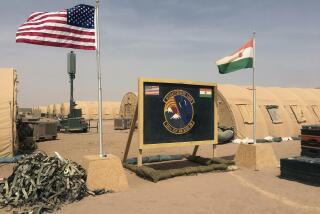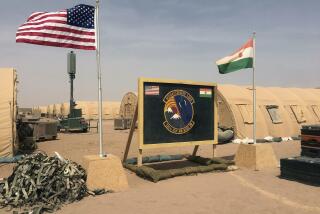Somalia Mostly Stable, General Says : Relief: U.S. commander says most of famine zone is under control and ready to be turned over to U.N.
- Share via
MOGADISHU, Somalia — The commander of Operation Restore Hope said Friday that seven of eight regions under his control in Somalia’s famine zone are now stable enough to be turned over to U.N. command.
“Right now, quite frankly, I could hand off most of (the country) to the United Nations. Today,” Marine Lt. Gen. Robert B. Johnston told The Times. “There’s more work to be done in Mogadishu, and we have a good game plan for that. So it should not really be too many days or weeks before we will be, in my judgment, ready to have the U.N. come in and take over our entire mission.”
Johnston, commanding general for the Marine Expeditionary Force based at Camp Pendleton, added that he thought it would be “a reasonable approach” to hand over parts of Somalia, incrementally, to a new U.N. commander, a move that would probably hasten the pullout of most U.S. troops.
The eventual handoff to the United Nations, a critical next step for Somalia, will elevate the international military mission here from peacemaking to a second, and in some ways riskier, peacekeeping phase. The transition to U.N. control also will launch a new era in the country’s history that, if successful, will create an environment for the long process of political reconciliation among Somalia’s warring clans.
But so far the United Nations has not taken any concrete steps to replace the United States as operational head of Operation Restore Hope.
Johnston said he is under no pressure--and no U.S.-imposed deadlines--for a U.N. handoff. But he said that after President-elect Bill Clinton’s inauguration next Wednesday, “I think the U.N. will move forward aggressively and send people out here.”
“What needs to be done very quickly is to get the U.N. command structure in place so it can begin working with me and my staff to orchestrate the handoff,” Johnston said.
Political and military analysts here say a shaky handoff could undo all the work that has been done by the 24,500 U.S. troops and 10,000 other foreign troops here. When the Marines came ashore five weeks ago, quickly joined by all the other American service branches and soldiers from 20 foreign countries, they replaced a hopelessly ineffective U.N. peacekeeping force of 500 Pakistanis. The Pakistanis, restricted by U.N. rules of engagement that allowed them to shoot only if fired upon, rarely ventured out of their camp at the Mogadishu airport.
The U.S.-led unified force, operating under rules that have allowed them to fire on Somalis any time troops felt their lives were in danger, has given new life to the international effort to save starving Somalis.
Isolated incidents of violence still have been reported in the countryside, but the overall security situation has improved markedly. Aid agencies are moving into areas long neglected because of security concerns, and relief food, under military escort, is reaching the people for whom it is intended.
In Bardera, however, Kurt Lustenburger, 32, a Red Cross administrator from Switzerland, was killed Thursday, and the International Committee of the Red Cross announced at its headquarters in Geneva that it was temporarily shutting down operations in Somalia.
A Red Cross spokeswoman in Nairobi, Kenya, said Lustenburger was shot by three men who entered his quarters and demanded money, the Associated Press reported. But U.N. spokesman Faruk Mawlawi in Mogadishu said he was accidentally shot during a wage dispute.
Many Somalis and relief workers worry that security gains made by the military mission could be lost when the United States begins withdrawing its troops and turns its headquarters over to a U.N.-appointed general. The United Nations--especially Secretary General Boutros Boutros-Ghali--is distrusted by many Somalis.
“We’re scared to death about what will happen when the U.N. takes over,” said Willet Weeks, director of Save the Children-U.S. in the Horn of Africa region that includes Somalia. His concerns were echoed by more than a dozen relief officials interviewed here.
The U.S. withdrawal could begin in days. A few hundred U.S. troops already have been sent home because of operational adjustments. But the current contingent of 24,500, including those on the ground in Somalia and on ships offshore, continues to grow daily.
Johnston declined to give a timetable for the Americans’ withdrawal. But he predicted that large numbers of U.S. troops probably would begin returning home within two weeks. Next week, Marines in Baidoa will be replaced by a newly arrived Australian contingent; foreign troops already have taken over operations from the Americans in other famine areas.
The United States is committed to retaining a presence in a future U.N.-led peacekeeping force. Some Army engineers may remain behind to help rebuild roads and bridges, particularly near the port of Kismayu. U.S. troops also will remain to provide logistic support, particularly communications. And U.S. officials have indicated that a strike force of perhaps 1,500 Marines is likely to remain on ships offshore.
When the transition to U.N. command is complete, a multinational force of 10,000 to 15,000 is expected to remain in Somalia.
Johnston said he is not worried about the United Nations’ low credibility among Somalis because he said the forces that will be under U.N. command already are on the ground.
“We already have a U.N. ‘footprint’ accomplishing and fulfilling fundamentally the same mission--to maintain the secure environment,” Johnston said. But he said that a key to the success of the U.N. mission will be maintaining the same rules of engagement.
“I don’t see how the U.N. can come in here, given the nature of Somalia and the propensity for bandit activity that is almost part of the culture, without the ability to protect their forces,” Johnston said.
“We have to ensure that they don’t end up, as has happened in past U.N. operations, having to take fire before they can return fire,” he added. “The result of that is that you are going to take casualties before you can respond. People here often resolve disputes at the end of a gun, and I’m not sure that we can end that no matter how long we stay here.”
The United Nations’ sinking credibility with Somalis may be shored up by the current performance of international forces, Johnston said. “You have a lot of key players already on the ground who have developed credibility with the Somalis,” he said. “They know the troops are there to help them and that they really are professionals. There may be some Somalis vying for power who want to challenge the U.N., but we can overcome that by having the Somali people clearly recognize the importance of the U.N. forces and their mission.”
Even after the United Nations selects a new commander, Johnston said, the transition will take weeks. And he says he hopes it is a general with strong operational experience. “It can’t just be some titular commander who happens to be a three-star (general),” Johnston said. “It ought to be a three-star who comes from a country that has, by virtue of the size of its military, a broader operational background.”
For now, though, Johnston says his forces are concentrating on Mogadishu, a city of bombed-out buildings that offer snipers plenty of cover. Marine patrols of the city have been stepped up, and U.S. troops have been confiscating heavy weaponry and finding large caches of weapons and ammunition. Troops staged a helicopter assault on an airport near Mogadishu on Friday, confiscating nearly 600,000 rounds of ammunition and 420 antitank grenades.
Although the U.S. contingent suffered its first two casualties this week from sniper fire, Johnston said he believes the sniping has been reduced. Fewer gunshots are heard at night in the city, at least partly because U.S. troops have confiscated thousands of guns, he said.
Johnston said he believes the bands of gunmen that had been systematically plundering Mogadishu have been driven underground or out of town or been disarmed.
More to Read
Sign up for Essential California
The most important California stories and recommendations in your inbox every morning.
You may occasionally receive promotional content from the Los Angeles Times.











